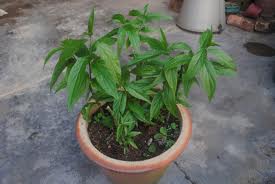Sabah Snake Grass Warning
News and information about Sabah Snake Grass (Clinacanthus nutans, 优顿草) is spreading in the Internet and claims that it can “cure cancer” abound. There are even normal healthy people ingesting this plant in the belief that it can “prevent cancer” and that is what really alarms me.
One should not be surprised that this plant can have anti-cancer properties. For ages, plant alkaloids have been a source of compounds used in modern chemotherapy e.g. the vinca alkaloids like Vincristine were originally derived from the Madagascar periwinkle, and taxanes like Taxol were derived from the bark of the Pacific Yew tree.
Ingesting these plant alkaloids is essentially taking chemotherapy in a raw form.
The plant will exert a chemotherapy-like effect on the individual though the response is variable as the “dosage” will be very crude (measured in the number of leaves one ingests without regard to the actual quantum of the active ingredient).
The notion that just because it is “natural” does not mean it does not have side effects. Indeed one would expect side effects as mentioned in this blog – if you take enough of the stuff, more toxic side effects will be experienced as expected with any cytotoxic agents.
I have personally seen patients where the blood counts dropped after ingesting Sabah Snake grass so yes, it appears to have a suppressive effect on the bone marrow like many other chemotherapeutic agents. There was a patient who had Acute Myeloid Leukaemia and underwent chemotherapy followed by a bone marrow transplant. She has remained in remission for over 15 years – effectively cured – but something possessed her to take Sabah Snake Grass recently. Perhaps she was influenced to think taking it would “prevent” cancer or improve her health.
This is misguided as it is akin to the idea that normal people should undergo chemotherapy to prevent cancer.
In this particular patient after taking 3 leaves a day for a year, her blood counts which were previously normal, started dropping, particularly her white cell count. Her MCV (Mean Cell Volume) also started rising, and one of the causes of a rising MCV is a drug affecting the maturation of the red blood cells. We do not know if in the long term there will be permanent damage to the bone marrow since some chemotherapeutic agents can cause a condition known as Myelodysplastic syndrome. She has wisely decided to immediately stop taking Sabah Snake Grass.
Lastly, please note that cancer is NOT one disease. Different cancers are different diseases and respond very differently to chemotherapy. Some are sensitive to chemotherapy e.g. lymphoma, NPC, breast and ovarian cancer, but some others are not. I am not surprised at all there will be anecdotal reports of apparent response of some patients with cancer after ingesting Sabah Snake Grass. After all, it is raw chemotherapy and if the cancer is sensitive it may respond. Response is not the same as cure as true cure means complete disappearance of cancer for at least 5 years. The word “cure” is sadly misused by many.
The worse thing cancer patients can do is to hide the fact from their doctors that they are taking Sabah Snake Grass. If they happen to be also undergoing conventional chemotherapy at the same time, the additional chemotherapeutic effects of Sabah Snake Grass may enhance toxicity to the organs.
Please, please do not fall for the “Natural = Safe” misconception.
Poison ivy is “natural”.
Poppy plants are “natural”.
Sabah Snake Grass is “natural” but it is chemotherapy. It probably warrants further research and identification of active compounds for use in modern chemotherapy, but if cancer patients take it, it is at their own peril or risk for there is lack of proper safety and efficacy studies.
Normal people certainly should not take it. Please help spread the word.
